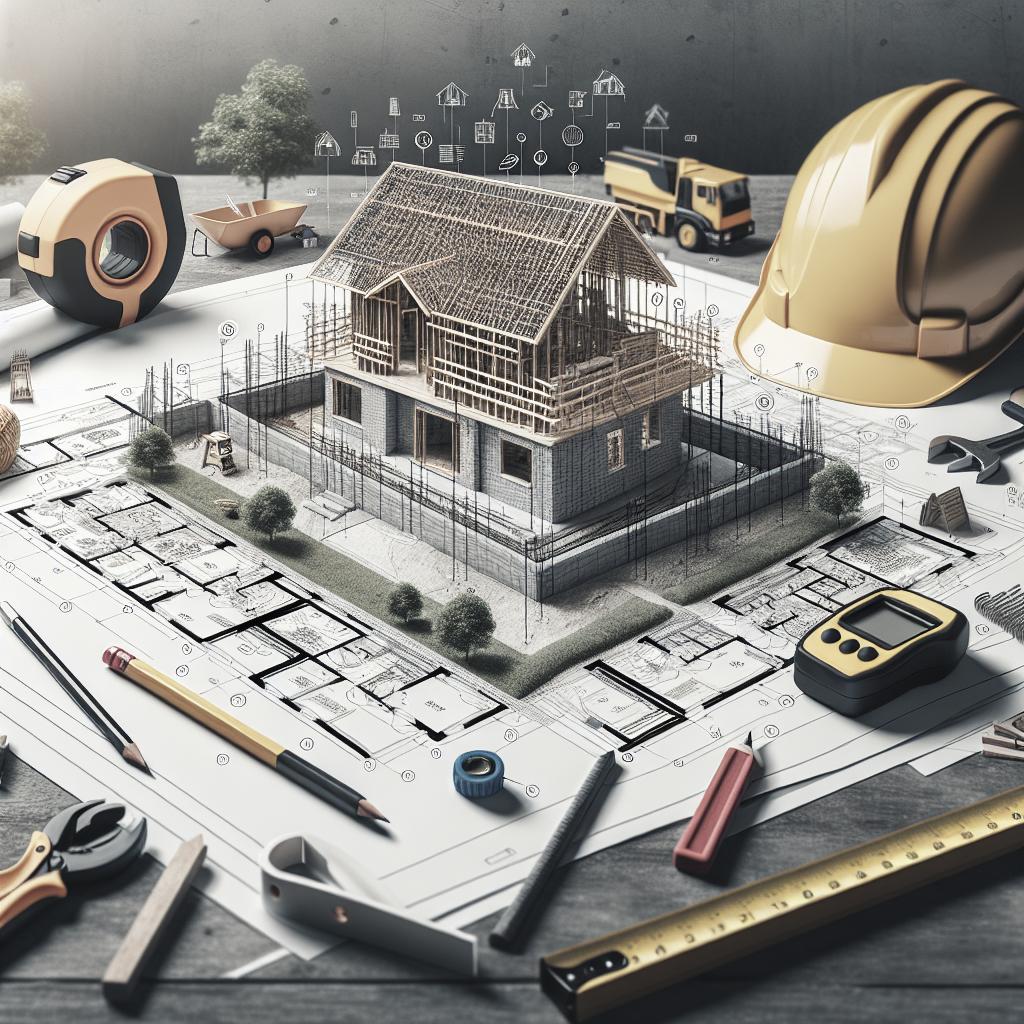Building a House in California: A Comprehensive Guide
California’s diverse landscape and desirable climate make it an attractive location for building a dream home. However, the process comes with its own set of challenges and costs. In this guide, we’ll break down the expenses associated with building a home in California, comparing custom homes to development projects, and exploring additional costs and savings opportunities. We’ll also touch on common styles of homes found in California, more affordable building options, and whether it’s cheaper to buy or build a home in this vibrant state. For anyone considering embarking on their journey to homeownership in California, this post offers detailed insights and practical advice to help you make informed decisions.
The cost to build a home in California in 2025, broken down
Step one: Talk to an expert!
Before laying the first brick or pouring any concrete, the initial and perhaps most crucial step in building a house in California is consulting with professionals. Experts like architects, builders, and financial advisors provide invaluable insights into the home building process, helping you understand zoning laws, building codes, and realistic budget expectations.
Having an expert on board can prevent costly mistakes down the line and will ensure the project adheres to local regulations. They can also help outline the scope of work, schedule, and the necessary permits required at various stages, which are specific to different Californian locales.
Buying a plot of land ($18,000 per acre)
Securing the right piece of land is a foundational step in building your home. In California, the cost of land can vary greatly depending on the city and neighborhood. On average, a plot might cost you approximately $18,000 per acre, though prices can soar in urban areas.
When selecting land, consider factors like proximity to amenities, the quality of local schools, and compatibility with your desired home style. Moreover, checking for any restrictions or easements on the property is crucial to avoid unforeseen problems.
Foundation ($4,039 to $14,848)
The foundation serves as the base of your home, and its cost can fluctuate between $4,039 to $14,848 depending on soil quality, type of foundation, and size. Different soil types across California can demand specific foundation solutions to ensure long-term stability.
Options range from concrete slabs to full basements, each with its own set of costs and benefits. Here, consulting with a structural engineer can provide insights into which type of foundation suits your land and budget best.
Framing ($1,408 to $7,666)
Framing is critical as it outlines the skeleton of your home. Prices in California can range from $1,408 to $7,666, varying with the complexity and size of the structure. The costs also depend on the materials chosen, with wood being the most common choice.
The framing process involves setting up walls, floors, and the roof structure. Precision here is fundamental, as mistakes can lead to structural failures. Hiring an experienced framing contractor can mitigate such risks, ensuring that the framework abides by safety standards.
Roof ($5,866 to $13,208)
Roofs are essential in keeping homes sheltered from California’s diverse climate. Depending on styles and materials, roofing costs may range from $5,866 to $13,208. Asphalt shingles are popular for their cost-effectiveness, whereas metal roofs offer durability.
California’s fire zones may also dictate your choice of roofing material, prioritizing flame retardant options. Ensuring that the chosen roof provides adequate insulation can aid in reducing energy consumption, leading to long-term savings.
Siding ($5,561 to $17,623)
Siding plays a significant role in the aesthetic and functional appeal of a home, with costs varying from $5,561 to $17,623. Calfornia’s weather necessitates choosing materials that withstand varied climates, like hardiplank or stucco.
Stylish, durable siding options can enhance the property’s market value. While considering costs, also factor in maintenance requirements and energy efficiency to optimize long-term satisfaction with your selected siding option.
Appliances ($2,100 to $5,400)
Homeowners frequently encounter costs between $2,100 to $5,400 for essential appliances. Energy-efficient options may have a higher upfront cost but can significantly reduce utility bills over time, something particularly pertinent in California.
Selecting the right appliances involves considering the home’s design aesthetic and functionality requirements. Look for options that carry the Energy Star label, optimizing your home’s overall sustainability.
HVAC system ($5,000 to $15,000)
California’s climatic diversity necessitates a well-functioning HVAC system, with costs averaging between $5,000 to $15,000. The right system will provide efficient heating and cooling, essential for dealing with the state’s varied weather.
Modern systems often offer enhanced energy efficiency, particularly important in California’s environmentally conscious culture. Ensuring that systems are tailored to your home’s unique needs will result in comfortable living spaces and reduced energy expenditures.
Plumbing system ($371 to $2,133)
Reliable plumbing is essential, with costs for installation ranging from $371 to $2,133. In California, environmental regulations prioritize water-saving technologies to manage scarce resources effectively.
Investing in efficient plumbing solutions can yield substantial savings on water bills and bolster your home’s environmental credentials. Skilled plumbers will ensure systems are installed well, reducing the likelihood of leaks and water waste.
Electrical system ($602 to $2,594)
The cost of wiring your California home might range from $602 to $2,594, depending on the size of the structure and desired setups. Cutting-edge electrical installations may offer smart technology integrations that promise energy savings.
Ensure your electrical contractors adhere to California’s strict electrical codes and safety standards. Efficient systems should be both reliable and able to accommodate ever-growing technological needs comfortably.
Building permits (variable)
Permits are a necessary expense in California, varying drastically by location and project scope. They serve as assurance that the build complies with local building codes and safety regulations.
Working closely with your contractor to navigate the permit application process will prevent legal hurdles and delays. Understanding local zoning laws, instituting robust planning, and obtaining required permits all contribute to smoother project completion.
Finishes and fixtures (variable)
The finishing touches of a home come with variable costs depending on your style and material preferences. Investing in quality finishes can uplift your home’s aesthetic while supporting functionality.
Decisions regarding flooring, cabinetry, countertops, and lighting fixtures are highly personal and affect overall satisfaction levels. Prioritizing durability and design harmony ensures a long-term appreciation of your living space.
Building a custom home vs. a home in a development
Architect (5% to 20% of the final build cost)
An architect’s touch can transform your visions into reality, influencing 5% to 20% of your building budget. Custom homes benefit greatly from an architect’s designs, ensuring that personal needs and stylistic inclinations are met.
Take the time to select experienced architects known for their keen understanding of California’s landscape, regulations, and isometry. The distinctive attributes they bring often distinguish bespoke homes from those in developer-managed communities.
General contractor (10% to 20% of the final build cost)
Engaging a proficient general contractor is key, with costs comprising 10% to 20% of the overall budget. Contractors handle crucial roles in coordinating end-to-end site processes, managing a team of workers, and steering the project toward completion.
Keen selection involves finding individuals who demonstrate transparency around scope, deadlines, and budgets. A well-thought-out contract that outlines terms and expectations serves as a foundation for trustworthy and effective collaboration.
Additional costs to build a custom house in California
Land survey ($376 to $768)
Owning precise plot boundaries and potential encumbrances requires professional land surveys, costing $376 to $768. This step is essential for planning appropriate land use and mitigating future disputes.
A detailed survey provides insights into topography and other geotechnical information critical for decisions on home placement and fit. Licensed surveyors yield reliable results, which can streamline further construction steps.
Excavation and grading ($1,660 to $6,716)
Preparing the plot for construction involves excavation and grading, with associated costs ranging from $1,660 to $6,716. These steps ensure that the land is suitable for building and meets any drainage requirements.
A contractor’s adept handling of site leveling minimizes erosion risks and enhances foundational integrity. The site’s natural topography, soil type, and climate all influence the details of this preparatory phase.
Average cost to build a home in California by city
The geographical and economic diversity across California means that construction costs vary widely between cities like Los Angeles, San Francisco, and San Diego. Urban projects often excel in speed and innovations but do require efficiency to manage higher costs.
Conducting city-specific research provides insights into local building traditions, cost spectrums, and potential auxiliary benefits driven by property value growth. Some cities offer incentives for green construction, promising long-term sustainability and savings.
Save thousands when buying a home
Eager homebuyers unable to commit to the intricacies of building might explore purchasing existing homes. Emphasis on strategic bidding, keen valuation, and thorough inspections often save thousands of dollars.
Working with seasoned real estate agents who possess intimate market knowledge empowers buyers to make pragmatic yet rewarding decisions. Additionally, government-backed financing options may alleviate initial financial hurdles.
Common styles of homes in California and their average costs
California is a melting pot of architectural styles including Spanish Colonial, Craftsman, and Modernist homes. Each style comes with its historical context, cost implications, and cultural significance.
Investigating design pros and cons helps filter choices to align with individual tastes and financial comfort levels. Some styles might favor low maintenance costs, while others focus on aesthetic appeal or spatial efficiency.
More affordable options for building a home in California
Tiny homes ($30,000 to $60,000)
Tiny homes represent a minimalistic lifestyle, offering reduced overheads. With costs between $30,000 to $60,000, they provide functionality over prime square footage, perfect for those prioritizing mobility or smaller carbon footprints.
As this trend gains traction, potential owners enjoy simplified building processes, customizable spaces, and a sense of community. However, they must navigate zoning laws, which can vary significantly across local jurisdictions.
Adding onto an existing house
Remodeling or expanding current homes presents a reasonable path to securing additional space without managing fresh construction complexities. Thinking through each modification ensures no disruption to the living experience.
Home expansions, while improving functionality and property value, must align with municipal codes and zoning policies. Cataloging existing home attributes highlights where improvement efforts could have optimal impact at minimal costs.
Is it cheaper to buy or build a home in California?
The decision to buy or build a home in California ultimately rests upon individual circumstances and marketplace timing. Building affords customization, yet remains unpredictable given labor, supply chain, and pricing fluctuations.
Purchasing a pre-existing home can usually suffice for quicker homeownership; however, it might demand concessions on specific customizations or designs. Economic analyses, focusing on long-term costs, enlighten prospects driven by investment horizons and comfort levels.
Get started on building your dream home
Embarking on building a home in California requires meticulous planning and detailed feasibility studies. Equip yourself with industry knowledge, forecast accurate expenses, and collaborate with experienced professionals.
Patience and diligent management yield the creation of a personalized space within California’s iconic environment. Prioritize the journey, leveraging invaluable resources gleaned throughout, into a rewarding and lasting venture into homeownership.
Related posts
What Is a Debt-to-Income Ratio for a Mortgage?
Understanding the importance of debt-to-income ratios in securing mortgages, providing insight into better financial planning for hopeful buyers.
How to Buy a House Before You Sell Yours (Without the Hassle!)
Navigating the delicate balance of buying a new home while transitioning from your current home gracefully and efficiently.
The Cost of a Home Appraisal in Indiana
Unpacking appraisal costs related to properties in Indiana to expand awareness on regional market evaluations.
How to Search Property Records and Learn Everything About A House
A guide to uncovering the valuable insights contained in public property records, optimizing your property investment decisions.
Future Prospects
| Category | Cost Range | Considerations |
|---|---|---|
| Land | $18,000 per acre | Location, restrictions, easements |
| Foundation | $4,039 to $14,848 | Soil quality, type, size |
| Framing | $1,408 to $7,666 | Size, materials |
| Roof | $5,866 to $13,208 | Style, materials, fire zone |
| Siding | $5,561 to $17,623 | Material durability, maintenance |
| Appliances | $2,100 to $5,400 | Energy efficiency, aesthetics |
| HVAC | $5,000 to $15,000 | Efficiency, climate |
| Plumbing | $371 to $2,133 | Water efficiency |
| Electrical | $602 to $2,594 | Code adherence, reliability |
| Tiny Homes | $30,000 to $60,000 | Mobility, zoning laws |


